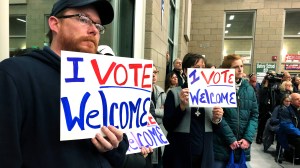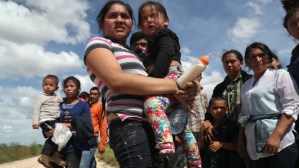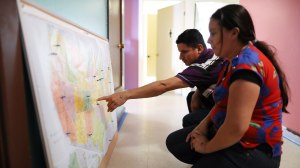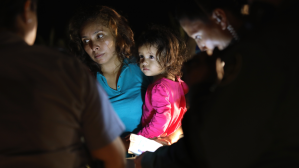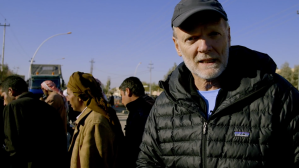In this series

Forty-one states and 86 local governments have filed letters with the federal government telling President Donald Trump and the administration they will continue accepting refugee resettlements in their jurisdictions, according to a list compiled by the Refugee Council USA.
Trump signed an executive order in September requiring state and local governments to opt-in to refugee resettlement, an additional layer of bureaucracy that Christian ministries to refugees feared could make it harder to “welcome the stranger.” The deadline was thought to be Christmas Day, but there has been a lot of confusion around that detail.
Resettlement organizations, most of which are faith-based, have until January 21 to file the letters with the federal government. In the meantime, Church World Service; Lutheran Immigration and Refugee Service; and HIAS (a Jewish-American nonprofit group) are taking the Trump administration to court to stop the executive order.
Support for Refugees
Many state and local governments used their letters to express support for refugees. “Refugees strengthen our communities,” wrote Minnesota Gov. Tim Walz. “Refugees are doctors and bus drivers. They are entrepreneurs and police officers. They are students and teachers. They are our neighbors.”
Some governors told personal stories of local refugees giving back to their communities, and others extolled the economic boon of refugee communities’ contributions to the local economy. Still others made their statements on principle.
“The United States has long presented itself as a haven,” Virginia Gov. Ralph Northam wrote. “We promote the ideals upon which this country was founded, of liberty and freedom. But to uphold those ideals abroad, we must allow access to them here at home. We must practice what we preach.”
Some governors, however, expressed support for the idea of the executive order, even as they consented to continue accepting refugees. Tennessee Gov. Bill Lee filed a letter of consent, but in it agreed that state and local consent to resettlement should be required. World Relief’s Matthew Soerens told CT, however, that resettlement has always been done in cooperation with local governments. The executive order doesn’t change that. It does create administrative complications, making the process harder, and provides cover for states no longer wishing to receive refugees, even if the cities within their borders do wits to do so.
Wisconsin Gov. Tony Evers wrote that he was “disappointed that the administration has created an overly cumbersome and inappropriate process for those involved in refugee resettlement.” Evers added that “At a time when we are seeing labor shortages across our state, it is irresponsible for the administration to place obstacles in the path of talented and hard-working folks seeking refuge and a better life.”
Evangelical Support for Governors’ Letters
As GOP governors weighed their decision, the Associated Press reported that evangelical Christians presented the strongest political counterpoint to the pressure those governors felt from immigration hardliners. The Evangelical Immigration Table delivered petitions signed by evangelicals to 15 governors on December 9.
The Evangelical Immigration Table letter to Texas Gov. Greg Abbott said, “Many refugees resettled by the US refugee resettlement program are Christians or other religious minorities who were persecuted for their faith in countries without our country’s constitutional commitment to religious freedom.” It continued, “Regardless of their background, refugees are human beings made in God’s image, with inherent dignity and potential, and we have been blessed by their arrival in Texas; we desire to continue to be able to extend love to these new neighbors as an exercise of our Christian faith.”
Faith-based organizations such as World Relief and Catholic Charities play a large role in helping refugees resettle during their six months of supported adjustment. North Carolina Gov. Roy Cooper and Connecticut Gov. Ned Lamont referenced the active role played by faith groups in refugee resettlement. Nevada Gov. Steve Sisolack’s letter referenced several of the organizations by name.
In 11 of the 15 states that the Evangelical Immigrant Table lobbied, governors signed consent letters. Four—Texas, South Carolina, Florida and Georgia—did not. Refugees will continue to be free to live in those states, as they are legal residents of the US. More will also be able settle there. The resettlement agencies, however, will not able to receive funds to help the newcomers adjust to life in America.
An amicus brief filed by the attorneys general of California, New York, Illinois, Maryland, Pennsylvania, Connecticut, Massachusetts, Virginia, Oregon, Minnesota, New Jersey, and Washington contends that the executive order will disrupt family reunification. Family reunification has been one of the primary goals of refugee resettlement in the US, and while the order still calls for some priority to be placed on immediate family, the attorneys general claim “the narrow family reunification exception in the Executive Order” will negatively affect “myriad established refugee communities with cultural connections and resources for employment and other support.”
Several states that have signed onto the amicus brief have not produced letters of consent, or have not made those letters available to the public, which is required by the executive order. There has been a lot of confusion around the consent process, which the amicus brief criticizes for its lack of clarity. New York has not sent a letter of consent, but advocates doubt the state will be refusing resettlement.
Biggest Impact Is on Texas
Should the new policy go into effect as written, the largest change to refugee resettlement will be in Texas, which did not submit a letter of consent. The state has, until now, received the largest numbers of refugees in the country. Texas will lose about $17 million in federal funds, which agencies distribute to refugees, who spend the money in their local economies, according to the New American Economy, an immigration and economics research and advocacy group. While this is a tiny fraction of Texas’s state budget, the impact on local governments and school districts could be more noticeable. Consenting counties like Bexar and Dallas Counties in Texas will not be able to receive refugee newcomers.
The financial realities, the local government’s openness to refugees, and the advocacy of evangelicals were not enough to persuade Abbott to consent to resettlement.
Washington Gov. Jay Inslee wrote that his state would take up the slack and accept refugees who would have been sent to states that are “unable or unwilling to accept refugee families into their jurisdiction.” According to Inslee, “they will be welcomed in Washington State.”
However, there may not be any slack to take up in 2020. Regardless of consent, all states could see a sharp decline in refugee resettlement because of the historically low resettlement cap placed by the Trump administration for the coming year. In their letters, some governors mentioned this larger issue.
Illinois Gov. J. B. Pritzker wrote that “With a global humanitarian crisis of more than 70 million forcibly displaced individuals, including 25 million who are refugees seeking asylum, the United States should continue to provide leadership, in partnership with other countries, to offer resettlement for refugees. Our nation has the capacity to admit significantly more than the 18,000-person limit set by the presidential determination for FY20.”
Opening arguments in the lawsuit filed by Church World Service, Lutheran Immigration and Refugee Service, and HIAS were set to be heard in federal court in Maryland on Wednesday.


